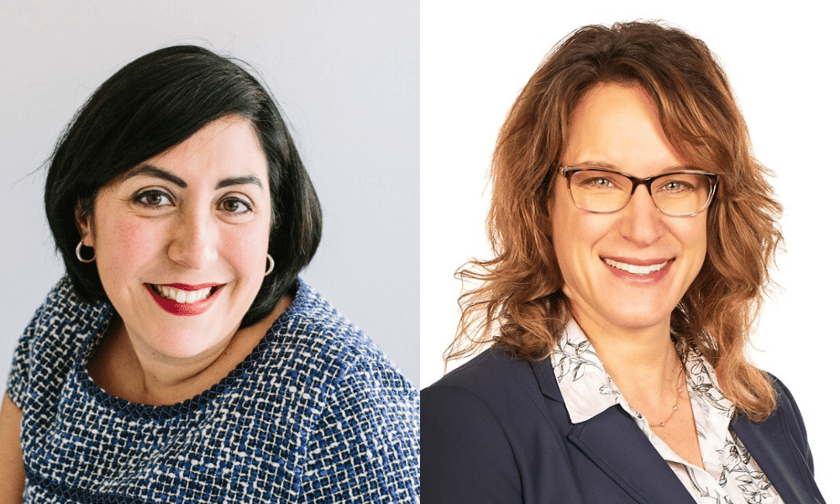

Amid a record year of natural catastrophes in Canada, the need for meaningful collaboration in addressing climate change and its disproportionate impact on vulnerable communities has never been more pressing.
This need has driven two of Canada’s biggest insurance companies, Gore Mutual and Co-operators, to team up on a data-sharing initiative called the Climate and Equity Lab. The project, launched in 2023 by the Gore Mutual Foundation with Social Innovation Canada and York University’s Faculty of Environmental and Urban Change, aims to uncover the impacts of climate change on vulnerable Canadian communities in urban environments.
According to Gaby Polanco Sorto (pictured on the left), VP & head of purpose and sustainability at Gore Mutual, the multi-year initiative spotlights three key issues: climate, equity, and poverty.
“We consulted 50 employees and key broker partners to identify pressing community concerns,” she said. “We decided to narrow our focus within these themes, particularly on the intersection of climate and vulnerable populations in Canada.”
Co-operators recently signed on as the national climate and equity partner, bringing its network and enhanced capacity to tackle the vast, interconnected factors driving climate risk among Canadians.
Shawna Peddle (pictured on the right), associate vice president of citizenship at Co-operators said joining the Climate and Equity Lab was a natural evolution of their work. The mutual insurance company had already been delving into the intersection of social vulnerability and climate risk through a long-term partnership with the University of Waterloo.
“When we started talking with Gaby and her team, it was clear that this was an alignment of values, purpose, and desire to drive meaningful impact in our communities,” said Peddle.
“We shouldn't be working separately on these issues. They are so critically important, and working separately means that we're doing things independently of each other when we should be working more collaboratively.”
Phase one of the Climate and Equity was dedicated to gathering insights directly from those most affected and creating a foundation of research to inform future actions. It culminated in a white paper, publicly shared as part of an open-source approach. It identified five key “levers of change” that can tackle mounting climate challenges in Canada:
Ultimately, each lever of change is anchored in fostering local resilience. The housing crisis and its intersection with climate resilience emerged as another pressing priority, with Polanco Sorto emphasizing the need to build homes designed to withstand a changing climate.
Peddle agreed. “Building resilient homes not only mitigates damage before it occurs but also aligns with our mission to help communities recover more effectively,” she said.
“For us (Co-operators), community-led climate resilience is about empowering communities to understand and act on their risks—not just providing information, but supporting meaningful, locally-driven solutions. Working closely with grassroots groups ensures people receive information in ways that resonate with them, driving real change.
“There’s already incredible, impactful work happening in communities that we can support and scale. It’s about enabling people to address their challenges in ways that make sense for them, rather than imposing top-down solutions.”
For Polanco Sorto, cooperatives and mutual insurance companies are uniquely positioned to facilitate this grassroots movement. “Ultimately, that is what insurance is for society,” she said. “So, this resonated with our business strategy and our philosophy around why we exist as an organization.”
The partnership with Co-operators, Polanco Sorto added, underscores the program's strength, not just in investment but in engagement, collaboration, and the potential for meaningful impact.
Phase two of the Climate and Equity Lab will focus on implementing solutions in two areas: community-led climate resilience and protective, accessible housing.
For this phase, Peddle emphasized connecting their citizenship work with business solutions to maximize their influence. “We can have a much greater impact as a business than we can through philanthropy and corporate giving alone,” she said.
Looking ahead, both organizations are also keen to expand the lab’s reach. “We've been actively engaging with cooperatives, mutuals, and credit unions because we share similar values in how we approach community work,” Polanco Sorto said. “Beyond that, we’ve also been connecting with the real estate sector, larger insurance organizations, and all levels of government.”
The goal is to ensure cross-sectoral engagement, as well as to maintain an open-source model for information. One of the biggest insights from last year’s labs and workshops, Polanco Sorto said, was how often people met for the first time despite working on similar resilience projects in the same communities.
“Many had never exchanged perspectives or considered how implementing one initiative could ripple across other related efforts,” she told Insurance Business. “Simply bringing the right people to the table to share insights—and, more importantly, to listen, especially to those on the front lines of this work—has proven invaluable.”
For Peddle, alignment of purpose and inter-industry collaboration is central to the lab’s value. "This partnership demonstrates in real time that the stakes are too high for 'business as usual' when it comes to protecting vulnerable communities,” Peddle said. “It’s critical to recognize that we are far more powerful when we work together.
“In a typically competitive space, the lab enables us to tackle significant challenges collectively. Funders and community partners alike can unite to address these issues, particularly in building financial security for Canadians and reducing climate risk.”
What are your thoughts on the Climate and Equity Lab? Please leave a comment below.
